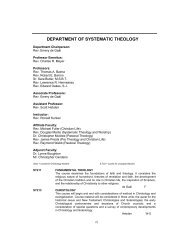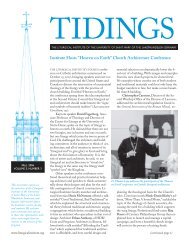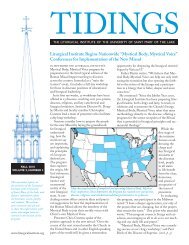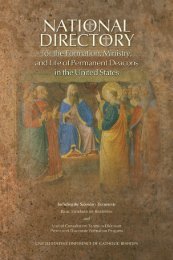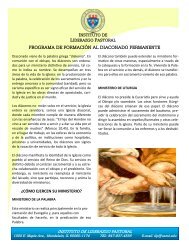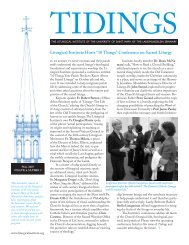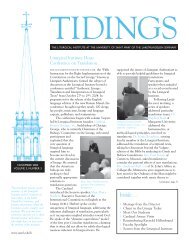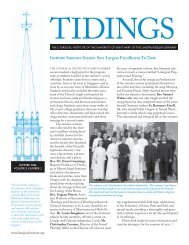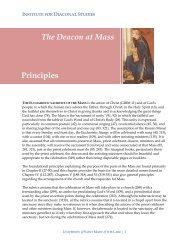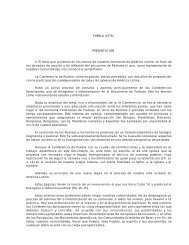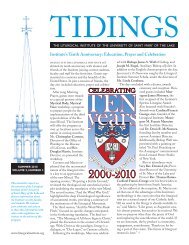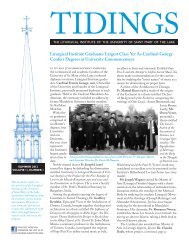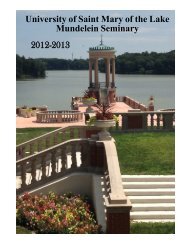Seminary and Graduate School of Theology - Mundelein Seminary
Seminary and Graduate School of Theology - Mundelein Seminary
Seminary and Graduate School of Theology - Mundelein Seminary
Create successful ePaper yourself
Turn your PDF publications into a flip-book with our unique Google optimized e-Paper software.
PH112<br />
PH113<br />
PH114<br />
PH119<br />
PH120<br />
MEDIEVAL PHILOSOPHY II<br />
A companion course to History <strong>of</strong> Medieval Philosophy I, this course will concentrate<br />
on the life, works, <strong>and</strong> foundational principles <strong>of</strong> St. Thomas Aquinas <strong>and</strong><br />
later developments (e.g. Nominalism). (Year II)<br />
Kricek<br />
F<br />
CONTEMPORARY PHILOSOPHY<br />
An in-depth consideration <strong>of</strong> authors in contemporary philosophy <strong>and</strong> their impact<br />
on Christian thinking, with concentration on Heidegger, Marcel, Kierkegaard, as<br />
well as James, Peirce, Dewey <strong>and</strong> the Pragmatic Movement. Other issues<br />
include: the human person <strong>and</strong> his/her relationship to God, others, <strong>and</strong> the<br />
world. (Year II)<br />
Rugen<br />
S<br />
ANCIENT PHILOSOPHY<br />
This course is a survey <strong>of</strong> the Greek philosophical tradition from the Pre-<br />
Socratics to the rise <strong>of</strong> Christianity. The course will concentrate on the reading<br />
<strong>and</strong> analysis <strong>of</strong> philosophical texts. Special attention will be given to the Pre-<br />
Socratics, Plato, Aristotle, <strong>and</strong> the early Christian Apologists. (Year I)<br />
de Gaál W<br />
LOGIC<br />
An introduction to logic <strong>and</strong> a look at critical thinking. Arguments <strong>and</strong> the assessment<br />
<strong>of</strong> their validity. Common fallacies <strong>of</strong> argumentation. (Year I)<br />
Rugen<br />
W<br />
PHILOSOPHY OF NATURE<br />
A study <strong>of</strong> the basic principles that allow us to underst<strong>and</strong> our world: causality,<br />
time, space, matter/form. The relationship <strong>of</strong> science <strong>and</strong> faith from a philosophical<br />
viewpoint. (Year II)<br />
Oakes<br />
F<br />
PH121<br />
HUMANITIES II<br />
A follow-up course to PH108. (Year II)<br />
Oakes<br />
W<br />
PH123<br />
EPISTEMOLOGY<br />
A study <strong>of</strong> the nature <strong>of</strong> knowledge. The various explanations <strong>of</strong> knowledge as<br />
presented throughout western thought. How we justify claims <strong>of</strong> truth. Various<br />
theories <strong>of</strong> truth. Skepticism, relativism. Faith <strong>and</strong> Knowledge. (Year II)<br />
Krieck<br />
S<br />
RELIGIOUS STUDIES<br />
RS101<br />
STUDY OF CHURCH AND RELIGION<br />
This introductory course in theology examines the fundamental ideas by which<br />
we underst<strong>and</strong> Christian faith – Christ, God, the Church, the nature <strong>of</strong> religion<br />
<strong>and</strong> <strong>of</strong> faith, <strong>and</strong> the methods <strong>and</strong> structure <strong>of</strong> theological study. Year II)<br />
Siwek<br />
S<br />
62



